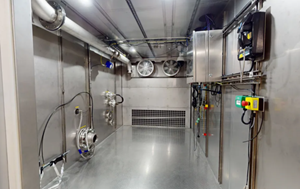News
Ricardo supports decarbonization in the maritime industry by expanding hydrogen capabilities
Ricardo, a global strategic, environmental and engineering consulting company, is expanding its capabilities in the global maritime sector, supporting clients with the design, development and testing of large-scale propulsion systems, including multi-stack fuel cell technology.
In January 2021 Ricardo announced that it had opened a brand new £2.5-MM H2 test facility at its UK headquarters in Shoreham-by-Sea, doubling its capacity to deliver H2 testing for global clients. The company has now confirmed that it has invested in the conversion of an existing building on site to facilitate the development of testing for large-scale marine engines.
Clients within the maritime sector will benefit from the new facility, as well as Ricardo’s experience and capabilities gained over several years as a market leader in H2 testing. The conversion will deliver state-of-the-art facilities to support Ricardo’s development of H2 and fuel cell services and solutions, being delivered to global customers.
Jason Oms O’Donnell, Managing Director of Automotive and Industrial at Ricardo said, “H2 offers a real alternative to supporting decarbonization in several industries, including maritime, commercial vehicles, off-highway and aerospace where the combination of high value assets, the longevity of fleets and the importance of safe implementation of new technology means that these sectors can be challenging to decarbonize. Our expertise and experience in design, development and test of innovative new propulsion systems means that we’re at the forefront of innovation in this area, advising customers, across the whole spectrum of services from life cycle analysis, supply chain and logistics to turnkey design, development and integration.”
“Ricardo’s involvement in the Sustainable H2 Powered Shipping (sHYpS) project means we are applying our world-leading expertise in the H2 value chain to implement innovative H2 technologies safely to help the global maritime sector achieve long term decarbonization goals. We are leading the specification, design, build and test of a 375-kW fuel cell module and the design of a 40-foot containerized multi-MW power plant that combined the outputs of several fuel cell modules. This latest expansion of our capabilities will help us to deliver future projects.”


